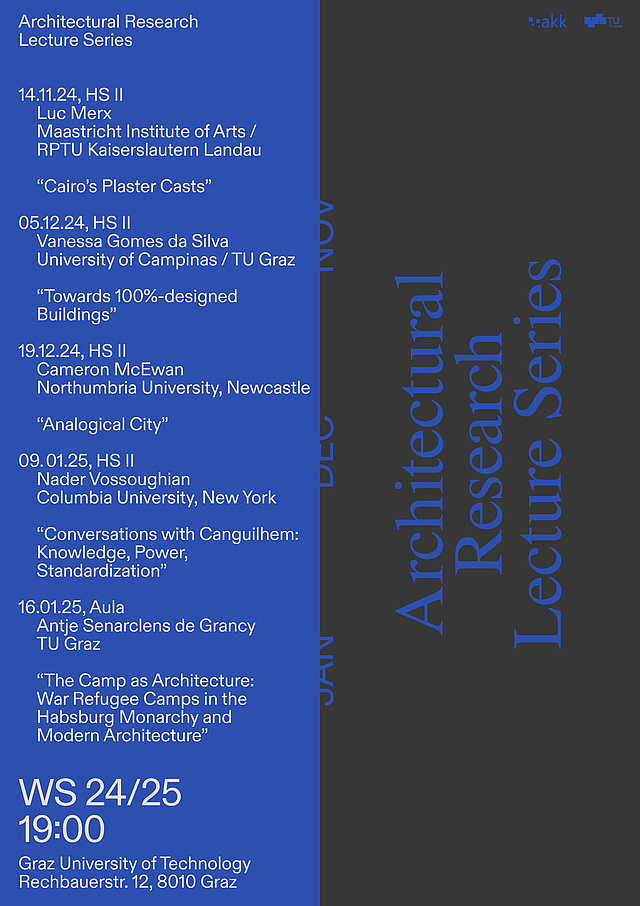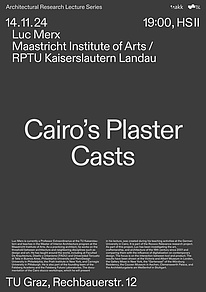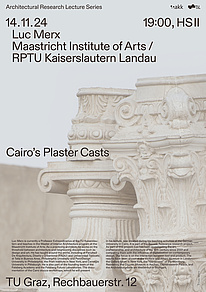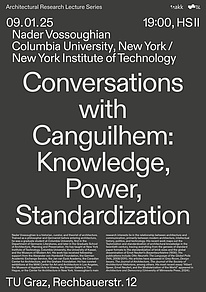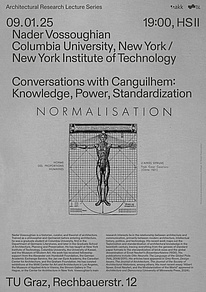Architectural Research Lecture Series
The lecture series "Architectural Research" is an integral part of the Graz Architecture Doctoral School. In the series, international as well as local scholars and architects present their architectural research projects, introducing research concepts, methods and results. In a follow-up workshop, registered participants can exchange ideas and discuss their individual approach with the lecturers.
Luc Merx is currently a Professor Extraordinarius at the TU Kaiserslautern and teaches in the Master of Interior Architecture program at the Maastricht Institute of Arts. As a practicing architect, he works on the threshold between architecture and neighboring disciplines such as design and art. He has taught around the world, including at Facultad De Arquitectura, Diseño y urbanismo (FADU) and Universidad Torcuato di Tella in Buenos Aires, Philadelphia University and PennDesign University in Philadelphia, the Pratt Institute in New York, and Carnegie University in Pittsburgh. He is also part of the founding team of the Felsberg Academy and the Felsberg Future Laboratories. The documentation of the Cairo stucco workshops, which he will present in his lecture, was created during his teaching activities at the German University in Cairo. It is part of the Rococo Relevance research project. As part of this project, Luc has been investigating the art, craftsmanship, and architecture of the 18th century since 2001 and comparing them with the influence of digitalization on contemporary design. The focus is on the interaction between tool and product. The results have been shown at the Victoria and Albert Museum in London, the Gallery Moss in New York, the “Gartensaal” of the Würzburg Residency, the Couven Museum in Aachen, Clemenswerth Palace, and the Architekturgalerie am Weißenhof in Stuttgart.
Vanessa Gomes da Silva is an architect and urban planner, with a Master and PhD in Civil Engineering. She is a full professor at the University of Campinas, Brazil, and currently a visiting professor at TU Graz, Austria. Vanessa was awarded the Zeferino Vaz Academic Recognition Award 2016. She has been a CNPq Productivity Fellow since 2008, and was a Jeffrey Cook Scholar in 2010, and a three-time Fulbright fellow visiting researcher and professor in the USA: at the University of Florida (2023-24), the Harvard School of Public Health (2014), and the University of Pittsburgh (2010). She has experience in architecture and civil engineering: sustainable design and construction, environmental assessment of developments, and life cycle assessment. She is part of the editorial board of the journal PARC and of the International Journal of Life Cycle Assessment (Springer Nature). In addition, she co-leads Subtask 2 of the International Energy Agency's Program on Energy in Buildings and Communities (IEA EBC) Annex 89 on net-zero whole-life carbon buildings.
Nader Vossoughian is a historian, curator, and theorist of architecture. Trained as a philosopher and Germanist before entering architecture, he was a graduate student at Columbia University, first in the Department of Germanic Literatures, where he received his MA in 1998, and later in the Graduate School of Architecture, Planning and Preservation, where he received his MPhil and PhD, the latter in 2004. Since 2005, he has taught at New York Institute of Technology, Columbia University, the University of Kassel, and the Museum of Modern Art. His work has received fellowship support from the Alexander von Humboldt Foundation, the German Academic Exchange Service, the Jan van Eyck Academy, the Canadian Center for Architecture, and the Graham Foundation. He has curated exhibitions at the MAK Center for Art and Architecture in Los Angeles, the Museum of Applied Arts in Vienna, the Stroom Gallery in the Hague, the Center for Architecture in New York among others. Vossoughian’s main research interests lie in the relationship between architecture and communication. The primary focus of his work has been modern architecture’s relationship to intellectual history, politics, and technology during the course of the twentieth century. His recent work maps out the Taylorization and standardization of architectural knowledge in the twentieth century, tracing everything from the genesis of standard paper formats to the standardization of brick sizes and the global dissemination of Ernst Neufert’s Bauentwurfslehre (1936). He is also writing an essay about art and politics in contemporary Iran, focusing on Tehran's Museum of Contemporary Art. His publications include Otto Neurath: The Language of the Global Polis (NAi, 2008/2011). His articles have appeared in Grey Room, Design Issues, The Journal of Architecture, The Journal of the Society of Architectural Historians, and other leading journals. His most recent essay, “Albert Speer, Ernst Neufert, and the Modularization of the World” appeared in Architecture and Democracy, edited by Reinhold Martin and Claire Zimmerman (University of Minnesota Press, 2024).
Antje Senarclens de Grancy is an architectural historian and associate professor at the Institute of Architectural Theory, Art History and Cultural Studies at Graz University of Technology. She studied art history and history at the University of Graz and anthropology at the Université Paris VIII. She was a long-time researcher at the interdisciplinary FWF Special Research Area Modernity in Central Europe around 1900 and (co-)led research projects on forgetting and remembering as a social practice in architecture, as well as on the institutionalization of the Heritage Protection Movement in Austria. Senarclens de Grancy was also a visiting researcher at the Edinburgh College of Art in 2018 and at the ENSA Paris La Villette / AHTTEP in 2022. Her research and teaching focuses on the history and theory of architecture in the 19th and 20th century in a social and political context, the canonization processes in architectural history, and the relationships and intersections between camp, modern architecture and urban planning. Her most recent book Lager als Architektur. Kriegsflüchtlingslager der Habsburgermonarchie und Architektur der Moderne will be published in November 2024.

